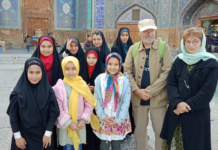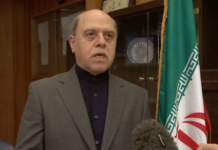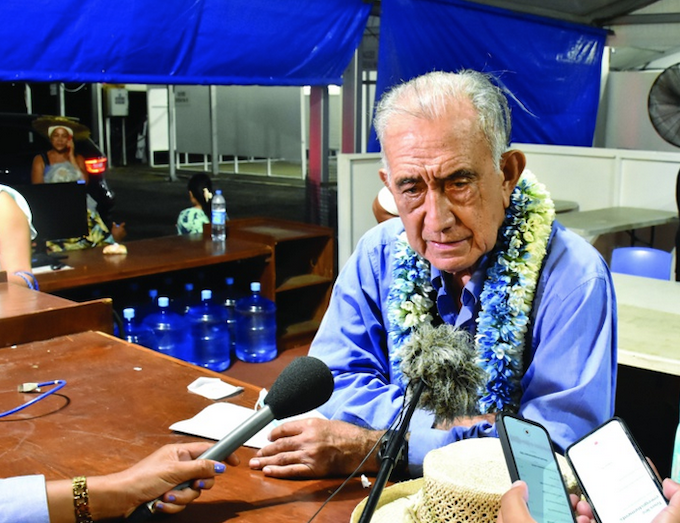
SPECIAL REPORT: By Ena Manuireva in Pape’ete
As the ballots were counted after the first day of voting in Mā’ohi Nui/French Polynesia territorial election first round, the “blue wave” of the pro-independence party Tavini Huira’atira led by Oscar Temaru topped the seven party lists competing.
Tavini was followed by the pro-French incumbent governing party Tapura Huira’atira of Édouard Fritch and the surprise alternative group led by a former finance minister under Fritch, Nuihau Laurey.
As for the other autonomist-leaning political parties who did not reach the 12.5 percent threshold required to enter the second round, they would probably encourage their followers to vote for autonomy.
- READ MORE: Temaru’s pro-independence party wins round one of French Polynesia’s elections
- Other Tahitian elections reports
In this first round, 56 percent of the population voted for the members of the Parliament, who will then elect the territory’s President.
This first result has come as no surprise to Oscar Temaru, giving him and his party a two-week campaign to entice the other 44 percent who did not vote in the first round to choose “blue” on April 30.
Undemocratic voting system
When I interviewed Oscar Temaru before the elections, he repeated to me that it should be one vote, one person and that’s the way democracy should work.
However, because France decides on the voting system, it also decides on the allocation of bonus seats (33 percent) for the party that wins most votes in the 57-seat chamber.
This extra bonus seat ploy appeared in 2004 under Gaston Flosse under the pretence of achieving political stability.
This strategy only favours big parties and is likely to keep the same party in power for a long time.
It is part of France’s responsibility to decide the type of vote, to dictate when to vote and how to organise the voting system.
The 33 percent bonus seats was geared to favour the autonomist parties but had the opposite effect in 2004 — despite all predictions — and put the UPLD (union for Democracy, which included Tavini) in power.
Temaru is hoping for a repeat of 2004. By the end of the second round on April 30, we will have the answer on who is going to govern Mā’ohi Nui for the next five years.
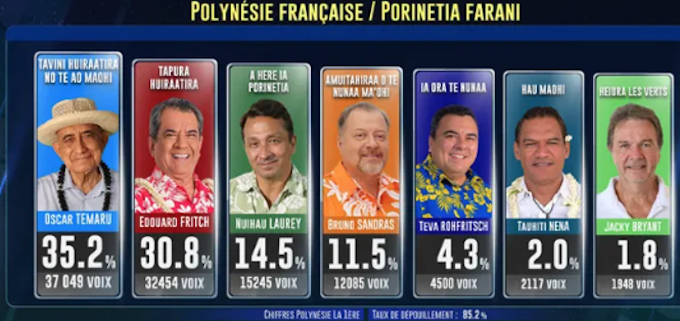
Temaru’s winning strategy
Riding on the back of their win at the last French national elections that saw all three seats allocated to Mā’ohi Nui/French Polynesia in the French Parliament won by pro-independence representatives, Temaru says it was a historic surprise for the French administration and for his people in Tahiti.
He knows that if he uses the same strategy for the territorial elections, he has a good chance of winning.
His approach is to concentrate on what he calls the “disillusioned youth”.
By applying the same approach, he is pitting youth against age because he noticed that the young people weren’t interested in the election because they were not given a voice.
When Oscar Temaru talks about young people, he means 18 to 35 years old — those who the governing administration do not see as potential voters and who rely on their “old guard” approach.
Temaru also talks about how the return of the Tahitian language during political meetings and rallies has had a huge influence on the Tahitian population that still represents about 75 percent of the electorate.
By giving the stage to young, committed and fluent speakers of both Tahitian and French, a whole new communication gap appears.
Fluent bilingual speakers
The pro-independence party offers a space for fluent bilingual speakers compared to the other sides’ representatives who are only fluent in French and speak hardly any Tahitian.
Temaru sees communication in politics as the winning formula.
If you control communication, you are in luck. That is what he did in the last elections in the capital city of Pape’ete for the first time and it was an important victory.
Temaru has also played on the generation gap that exists between the various candidates who are presenting themselves.
He cited veteran politician Gaston Flosse as the main example, emphasising that the future of the Mā’ohi people belongs to the young generation.
When Flosse presented himself in the last elections, he was 91 years old and the youngest lawmaker in the whole of the French Republic from Tavini was only 21 years old. There is a difference of more than three generations between these two candidates.
‘Disrespectful behaviour’
According to Oscar Temaru, the polls show that a huge number of people are against the Fritch government because of:
- The “appalling handling “of the covid pandemic;
- the intervention of the French government in the local health system;
- the scandal of the wedding of the year when a vice-president broke the covid isolation rules — Tahiti’s ‘wedding of the year’ turns into political row over covid hypocrisy | Asia Pacific Report;
- the disrespectful behaviour of President Fritch against the opposition in parliamentary debates; and an unpopular new social tax that has penalised the poor even more.
People now look to the idea of independence as an alternative. Winning these elections would give the Tavini a historic majority in both the Territorial Parliament and the French National Assembly as the only representatives of Mā’ohi Nui would be pro-independence.
Oscar Temaru sees both victories as a stronger mandate enabling Mā’ohi Nui to go to the United Nations and discuss the issue of independence.
He says that every time he talks about Mā’ohi Nui as an independent country, the representatives for France stand up and leave — they don’t want to discuss it.
President Édouard Fritch would go to the UN and say that the population supported their attachment to the French state.
So, this is why it’s really critical for Oscar Temaru to win these elections and change many things in this country.
Internal discords at the Tavini
Is there a tug war between factions of the Tavini Huira’atira after one of the party’s pillars, Eliane Tevaitua, was replaced by a newcomer?
“No. Everybody understands that we have to work together – the older generation and new generation, we need to mix them up,” Temaru says.
“The young generation understands that they need the experience of people who know what is going on. It’s very easy to make them quickly operational because they are smart young people and very interested in politics.”
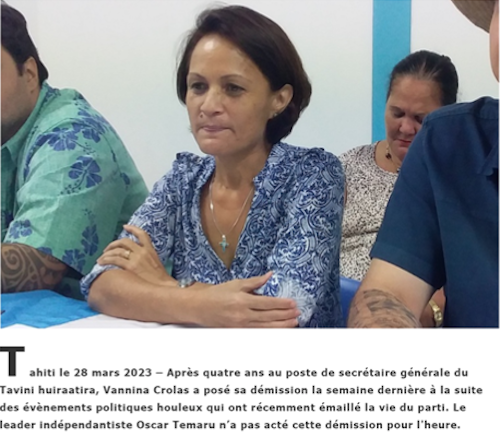
When the long serving Tavini Huira’atira member of the Territorial Assembly was replaced, the online Tahiti Infos ran an article claiming that Tavini’s general secretary Vannina Ateo had offered her resignation to Oscar Temaru.
However, Ateo said she had never offered her resignation and this was a campaign of disinformation.
Tavini’s vision
Oscar Temaru: “If we win the territorial elections, we will be able to tell France, let’s sit around the table and talk about the future of our country in the presence of the UN as a referee.
“We will put on the table everything that concerns the people of this country. Let’s talk together step by step about agreements of cooperation in the different areas for the future.
“The UN will be the referee between us and France regarding those agreements.
“For us this will not be a repeat of the Noumea Accords because I am one of those who knew what happened exactly to the New Caledonia issue.
“In 1986 after the resolution was adopted by the UN to put New Caledonia on the list of countries to decolonise, there was no talk about going to Paris and meeting with the right-wing Jacques Lafleur.
“It was a decision taken by Jean-Marie Tjibaou and we knew after that the freemason people were the ones who worked behind the scenes to organise that meeting in Paris.
“So, it took more than 30 years from 1986 to 2008. And from 2008 until today the Noumea Accord has become a stalemate.
“We don’t want that kind of accord because while the Noumea Accord was being discussed, at the same time we have had a statute of autonomy which started in 1977 and is now 46 years.
“So, after the autonomy — call it as you like, autonomy management, autonomy intern, self-governance — no we don’t want any of those new titles for our country.
““We will not go through the nearly 40 years of negotiations that New Caledonia went through. For us the UN will fix the date for the referendum so maximum, let’s say 10 years.
“We want to put the economy of this country on the right track, to educate our people — that’s the main point, how to change the mindset of our people and that is a hard job.
“It won’t an easy discussion so we will need top people to go to the UN to talk to the French, because they don’t want to lose their stronghold on this country that is as huge and as big as Europe, with all the resources.
“So that’s why the French administration don’t want to lose it.
“Thanks to the UN for having adopted the last two resolutions in 2020 and 2021 which tell the French to respect our sovereign right and our rights on every resource on this country.
“If France loses this part of Ma’ohi Nui, it will lose everything and Noumea will follow suite when their turn comes again.”
In response to the last question, about Oscar Temaru himself — what is going to happen to him, he says “we will wait and see what God decides, aye!”
At the age of nearly 80, he still has the fighting spirit and he hopes that in five years’ time he will still be here.
“Maybe there will be a new leader for this country. I don’t know, but at the moment I am still fighting.”
Ena Manuireva is an Aotearoa New Zealand-based Tahitian doctoral candidate at Auckland University of Technology and a commentator on French politics in Ma’ohi Nui and the Pacific. He contributes to Asia Pacific Report.




